An exploration of the five key concepts that make the show so intriguing and get us so emotionally invested in its characters
Arcane is an animated series released on Netflix in November 2021. It is based on the video game League of Legends, though you don’t need to have played the game or know anything about it to enjoy the show. At the time of this writing, it has an impressive 100% rating on Rotten Tomatoes and 9.2/10 on IMDb.
Off the bat, you’re sure to notice the gorgeous artistry and flowing animation. Some scenes experiment with different art styles, the most striking one being a duel between two characters in episode seven. The fantasy-steampunk world is beautifully crafted. On one side of a bridge, we have Piltover, the tall, gleaming, sophisticated “city of progress.” On the other is Zaun, the “undercity” crawling in trenches and chasms, saturated with noxious fumes and seedy activities.
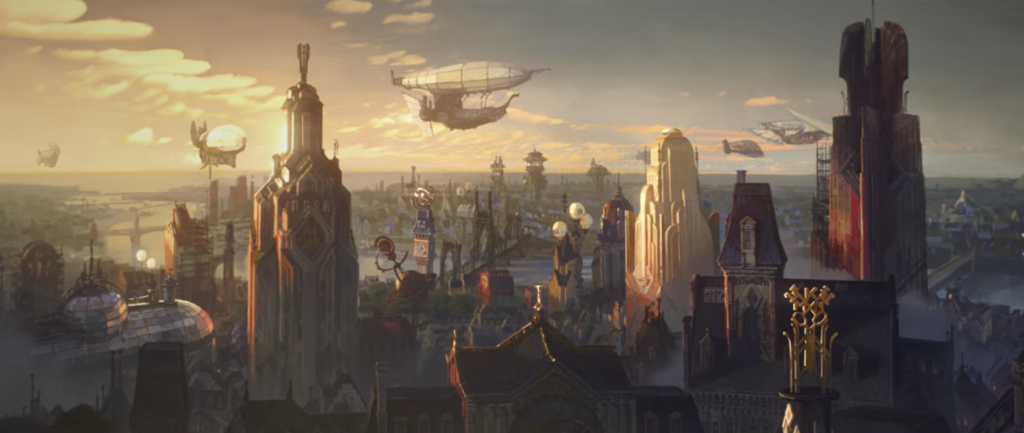
And of course, there’s the story itself. There’s a rich cast of characters, and their actions and developments intertwine around some compelling core themes: loyalty, family, progress, communication (or lack thereof), and power. Reflecting on these themes, you’re sure to appreciate this first season more profoundly and get even more hyped for season two—whenever that will be.
Warning: beyond lie spoilers for the full first season.
Loyalty
This is the most salient theme in the series so far. Loyalty is everything. It begins with pink-haired Vi’s loyalty to, and love for, her blue-haired sister Powder. Orphaned by the Piltover-Zaun conflict, they are each other’s only remaining family. Sure, they quickly find a new father figure in Vander and add brothers Mylo and Claggor. But at the end of the day, Vi still loves and defends Powder above all. Even after being imprisoned for years and returning to Zaun to find Powder rebranded as Jinx, Vi doesn’t give up on Powder and still wants the two of them to stick together. Given a choice between an estranged sister and a potential romantic partner (Caitlyn the “cupcake”), she chooses the former.
Zaun’s monocular criminal overlord, Silco, talks about the importance of loyalty when meeting with the other “Chem Barons,” or mob bosses. He claims it’s because they’re all in this together, underdogs trying to break free of Piltover’s chains. But there’s also a deeply personal reason for demanding unwavering fealty from everyone around him: Vander’s brutal betrayal long ago. Failure to comply is punishable by death, as evidenced by Vander and Finn, the tattooed, golden-grilled Chem Baron.
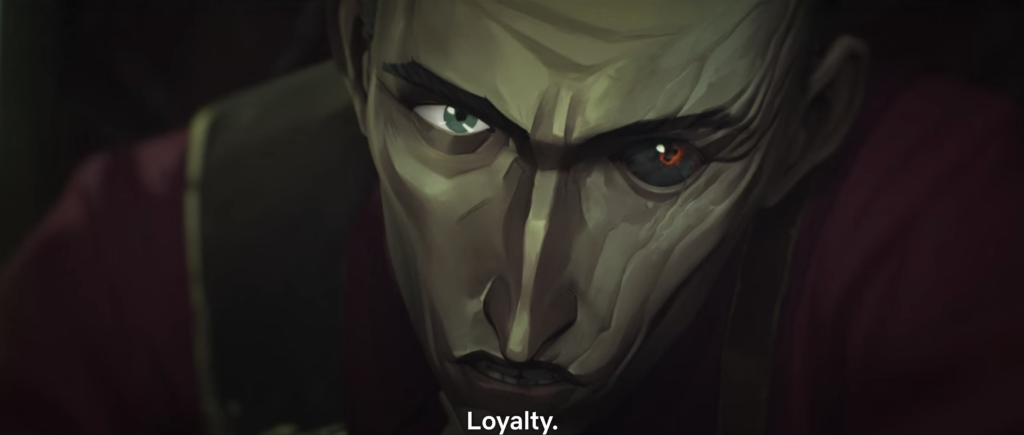
Sevika, or “buff Rihanna” as I called her to my partner while we watched the show together, makes a critical decision in the finale to remain devoted to Silco and decline Finn’s proposition. Interestingly, Silco has a fleeting expression of shock and fear as her blade slashes out. Although Silco demands loyalty, he’s not so naive as to expect it all the time. For a terrifying moment, he genuinely did not know whom that blade was targeting.
Silco himself is extremely loyal to his adopted daughter, Jinx. He defends her in front of others who complain about her rash moves and instability. He regularly tells her how important she is to him. She is the only one he trusts with the hex crystal. When asked to hand Jinx over to Piltover’s authorities in exchange for finally achieving his longtime dream of sovereignty for Zaun, he struggles immensely with the conundrum but ultimately chooses to keep Jinx by his side. (At least, that’s what he tells her, and I believe it.)
Topside, we don’t see nearly as much of this theme. Jayce, the inventor cum councilor, agrees to grant his childhood friend Caitlyn the favor of an audience with the Council. That’s about it. Double-timing cop Marcus seals a deal with Silco that winds up getting his colleague killed. Jayce turns on his former mentor and fellow councilor, Heimerdinger, ousting him from the Council. The rest of the Council seems far more interested in increasing their personal wealth than in the populace they’re supposed to protect and support.
Family
In Zaun, families tend to be chosen or simply nonexistent. A “traditional” nuclear structure feels like a luxury here, where people keep getting killed by Topsiders or just dying (directly or indirectly) from poverty. Vander takes Vi, Powder, Mylo, and Claggor under his wing. Silco adopts Powder as his daughter after she is left alone in an alley. Ekko has his commune of Firelights. Intubated mob boss Renni is the only one with a biological family member—a young son—but she loses him when Jayce and Vi infiltrate Silco’s Shimmer facility.
Only in Piltover are blood families able to stay together: Jayce and his parents, rich-girl cop Caitlyn Kiramman with her parents, and Sheriff Marcus and his daughter. Even immigrant Mel has her mother come for a visit.
Yet the families seem more “real” in Zaun, the bonds stronger. Zaunites tend to be more loyal to their chosen families, as explored in the previous section. After his mother pleas with the Council for mercy, Jayce barely interacts with his parents in his quest to bring magic to the masses and his ascension to the Council. Caitlyn feels oppressed by her parents, and her parents don’t appear to appreciate her choices or think she’s ever good enough. We never see Marcus play with his daughter, although presumably, he loves her very much and everything he does is for her. Mel was disowned by her family, and her relationship with her mother is clearly strained.
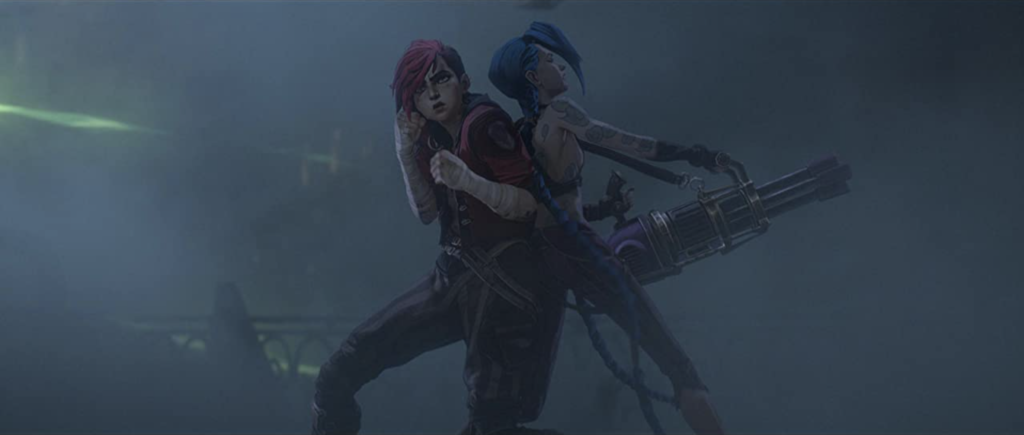
Of course, Marcus dies, too—so not all the blood families in Piltover are safe. Perhaps this is karma for wheeling and dealing in Zaun.
Progress
The “city of progress” loves this concept so much that they even have a holiday called Progress Day. People here work hard on commerce, research, and new inventions. Yet as much as Piltovians pride themselves on technological and economic advancements, they don’t consider morality as part of the equation. Nor do they deign to share the profits with Zaun. They love counting the land as part of theirs but do nothing to progress the quality of life for the people living there. Besides Heimerdinger, none of the Councilors have even visited it.
In addition to having this insular definition of progress, Piltover seems to think they hold a monopoly on it. They concede that Zaunites could figure out how to use hex crystals and weaponize them because they themselves can already do it. Piltovians are constantly surprised by other things the undercity can do because they assume it’s just a bunch of savages over there. They’re awed by Jinx’s grenade, by the Firelights’ hoverboards, and by the enormous tree the Firelights have grown in their compound. I’m sure the Enforcers would have marveled at Jinx’s mechanical firelights, too… had any of them lived to tell the tale. In the undercity, necessity is truly the mother of invention.
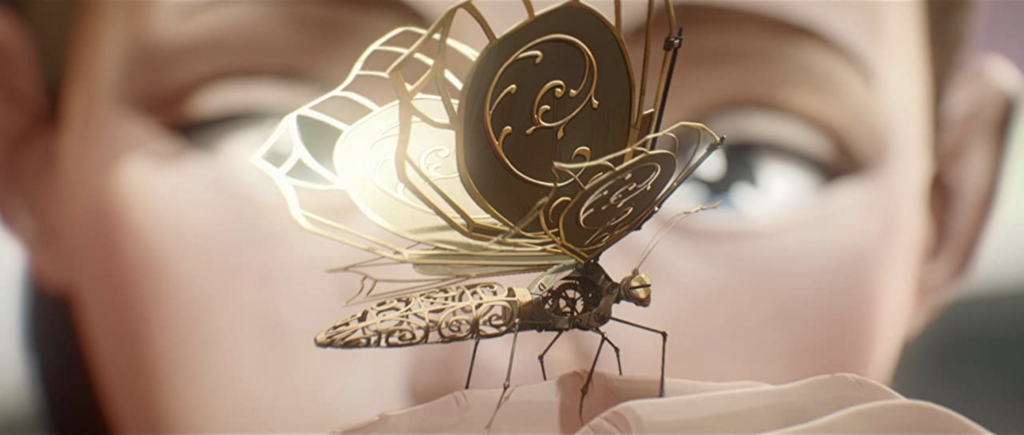
For Vi, progress means a better life for herself and her sister, even if it means leaving the only place they’ve called home. She doesn’t care about wealth or the stupid little blue spheres (except when they’re later imbued in gauntlets that she wears to fight her way to Powder); she just wants to be with the few loved ones she has left. For Silco, it’s all about liberating Zaun from Piltover’s reign. His control of the undercity, though well and good, is but a means to this end. For Ekko, people need to live, not just survive. Progress, therefore, requires healing and health, not only of humans but also of the planet.
(Mis)communication
Communication, miscommunication, and the absence of communication together form the greatest tragedy of the storyline. There’s a reason this theme is the crux of every romantic comedy (two people meet, get together, have a misunderstanding, sort it out, and live happily ever after): it feels quintessentially human, and tugs at our heartstrings like nothing else.
It starts from young Powder overhearing her adopted brother Mylo calling her a jinx. The word sticks in her mind like a splinter and makes her more desperate than ever to help the team and prove her value—to disastrous results. After Powder blows up Silco’s factory, Vi yells at her and agrees she is a jinx. This, the blue-haired girl says, is the defining moment when Powder becomes Jinx.
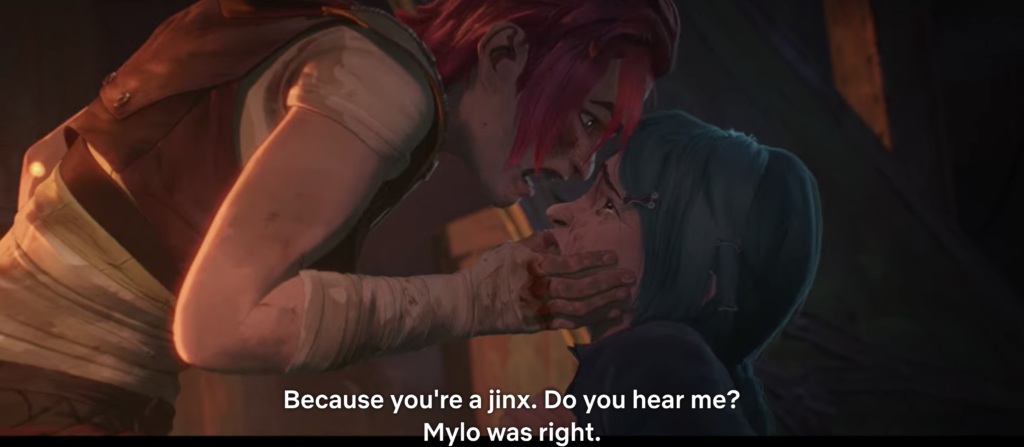
In the season finale, Jinx is once again lurking around the corner when she overhears Silco’s monologue. Which should he choose: Zaun’s nationhood or his beloved daughter? He doesn’t come to a conclusion on the spot, but Jinx is nevertheless outraged. If only Silco could have talked to Jinx sooner and reaffirmed his unwavering love for her! It might well have saved his life.
And if only Jinx could have heard the Council voting to grant Zaun its independence during that final scene. It seemed the years-long conflict was a mere moment from finally ending. Silco’s dream was about to manifest at last. Now, thanks to this Chekhovian development, hostilities will undoubtedly reignite between the two cities. Who knows how long it will take to resolve them this time?
Lesson for everyone in Zaun? Don’t say anything out loud that you wouldn’t want Jinx to hear. But also, if you’ve got something super important that Jinx should probably hear, make damn sure she is around.
Power
Every fantasy story is, at its core, a story about power. Who holds power, how that power manifests, when and how power changes hands, and how power is wielded to accomplish different parties’ goals. In Arcane, this theme has a few variations.
There’s obviously government control and military force, with battles fought between Piltover’s Enforcers and Zaun’s guerrilla “rebels.” For Topside, this strength is bolstered by international trade through the Hexgates. For the undercity, the production of Shimmer enhances fighters as well as finances. The season finale leaves both sides in a lurch. Most, if not all, of Piltover’s councilors, will surely be dead or injured once Jinx’s shot hits; they need a new sheriff, as well. Silco’s death is bound to cripple Shimmer production and stir up a power struggle among Jinx, Sevika, and the remaining Chem Barons.
The introduction of Mel Medarda’s mother, the ruler of another nation called Noxus, late in the season suggests that international politics could play a bigger role next season. Who is threatening Noxus, and how will this force Jayce and Viktor’s direction of Hextech research? As for Jayce, he still has little political savvy or nuance—another form of power. Though he’s learning quickly, he remains unsettlingly dependent on Mel’s guidance. One might even say he’s susceptible to her manipulation.
Intelligence is an important kind of power, too. Piltover has Jayce, Viktor, and an academy full of researchers and inventors. There’s also Caitlyn, who impressed Vi with her mapping and analysis of the undercity before ever stepping foot inside. In Zaun, the masked scientist Singed, Jinx, and Ekko have all proven themselves to be extremely clever and innovative. Now that Ekko probably has Heimerdinger as a mentor, he may become even more of a key player.
Last but not least, the arcane magic of the hex crystals. This season has just scraped the surface of what’s possible with magic in this world. Viktor seems closest to understanding it, but Jayce and Vi have made rapid progress with hex weapons. It’ll also be very interesting to see what Jinx unlocks next season. And who was that guy who saved Jayce’s life back in the day, anyway? Is there a whole society of mages out there? If so, are they going to make a move on Piltover/Zaun?
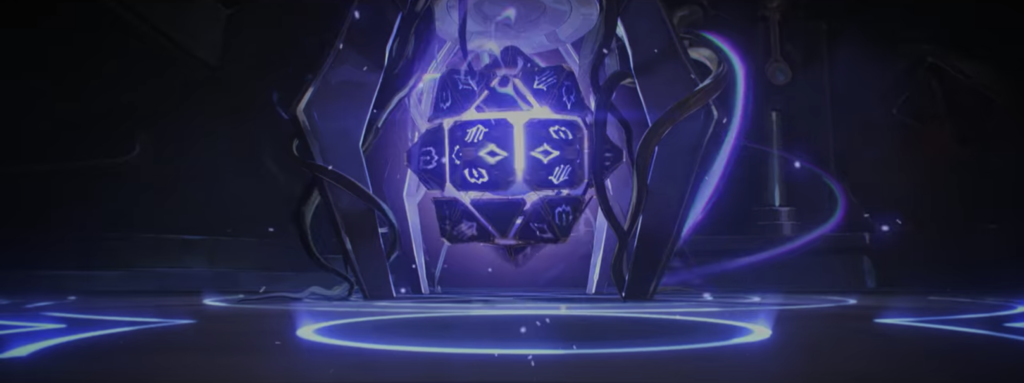
Conclusion
If you’ve never played League of Legends, it’s easy to write off Arcane as “just another video game show.” However, as I mentioned earlier, you don’t need to know anything about the game to enjoy the series. The world and characters are intriguing, along with the intricate ways they revolve around the five themes I’ve explored here.
Are there any other meaningful patterns or motifs you noticed throughout the show? Let us know in the comments.
